What is Strategy Consulting?
In today's rapidly evolving business landscape, organizations face numerous
In today's rapidly evolving business landscape, organizations face numerous challenges when it comes to making critical decisions that impact their growth and success. This is where strategy consulting comes into play. Strategy consultants, often referred to as business strategy consultants, offer valuable insights and expertise to help businesses navigate complex issues, optimize their operations, and achieve their goals.
In this comprehensive guide, we will delve into the world of strategy consulting, exploring its definition, types, benefits, required skills, and the top firms in the industry. Whether you're a budding consultant or a business owner seeking guidance, this guide will provide you with the knowledge and insights needed to harness the power of strategy consulting and drive your organization toward sustainable success.
Strategy consulting is a specialized field within management vs strategy consulting that involves providing organizations with expert advice and guidance on high-level strategic decisions. Business strategy consultants work closely with executives and senior management to understand their goals, analyze market trends, identify challenges and opportunities, and develop strategic plans to achieve sustainable growth and competitive advantage.
Strategy consulting encompasses a wide range of disciplines and areas of expertise. Consultants may assist organizations in formulating corporate strategies, optimizing operations, entering new markets, managing change, and driving innovation. They leverage their deep industry knowledge, analytical skills, and strategic thinking to help businesses make informed decisions and navigate complex business challenges.
Strategy consulting can be categorized into various disciplines, each addressing specific organizational needs. Some common types of strategy consulting include:

In the following sections, we will explore the role of strategy consultants in depth and discuss the benefits they bring to organizations.
Organizations often turn to strategy consultants for several reasons. Firstly, consultants offer an external, unbiased perspective. They bring a fresh set of eyes to the table and can objectively analyze business challenges and opportunities without being influenced by internal politics or biases. This objectivity enables consultants to identify innovative solutions and offer strategic recommendations that executives may have overlooked.
Secondly, strategy consultants possess deep industry knowledge and expertise. They have worked with a diverse range of clients across various sectors, allowing them to understand industry trends, best practices, and emerging opportunities. Their insights and experience equip them with the ability to identify market gaps, assess risks, and design tailored strategies to help businesses achieve their goals.
Engaging strategy consultants can yield numerous benefits for organizations. Here are some key advantages:
In the next section, we will explore the skills and qualifications required to excel in the field of strategy consulting.
Strategy consulting requires a unique blend of skills and qualifications to effectively analyze complex business problems, develop strategic recommendations, and engage with clients at the highest levels. Here are some essential skills and qualifications for aspiring strategy consultants:
Analytical skills are critical for strategy consultants, as they involve collecting and analyzing vast amounts of data to identify trends, draw insights, and make informed recommendations. Consultants must be proficient in quantitative analysis, data interpretation, and modeling techniques to drive evidence-based decision-making.
Effective communication and strong interpersonal skills are vital for strategy consultants. They work closely with clients, senior executives, and cross-functional teams, requiring the ability to build relationships, influence stakeholders, and navigate complex organizational dynamics. Consultants must be adept at active listening, clear articulation of ideas, and persuasive presentation skills.
Strategy consultants often work on multiple projects simultaneously, each with its own deadlines and deliverables. Effective time management is crucial to ensure that all projects are completed on time and to the highest standards. Prioritization, organization, and the ability to work under pressure are essential skills for success in a fast-paced consulting environment.
Strategy consultants operate in dynamic and rapidly changing business environments. They must remain adaptable and flexible in response to evolving client needs, emerging market trends, and shifting project requirements. The ability to quickly assimilate new information, pivot strategies when necessary, and embrace change is crucial for consultants to thrive in their roles.
While possessing these skills is necessary for a career in strategy consulting, obtaining the appropriate education and qualifications is also essential. In the following section, we will explore the common educational paths and qualifications for aspiring strategy consultants.
The strategy consulting industry is home to several prominent firms, each offering unique expertise and services to support organizations in their strategic decision-making processes. Let's take a closer look at some of the top strategy consulting firms:
The Big Three—McKinsey & Company, Boston Consulting Group (BCG), and Bain & Company—are widely recognized as the leading strategy consulting firms. These firms have established a strong reputation for delivering high-quality strategic advice to clients across industries. They have a global presence and work with some of the world's largest and most influential organizations.
McKinsey & Company: McKinsey & Company is a global management consulting firm that advises organizations on strategic issues, operational challenges, and transformational initiatives. They focus on driving long-term sustainable growth and have a diverse range of practices spanning various industries.
Boston Consulting Group (BCG): BCG is a leading management consulting firm with a strong emphasis on strategy. They work closely with clients to develop innovative solutions, drive organizational change, and create a competitive advantage. BCG is known for its rigorous analytical approach and thought leadership in the field of strategy consulting.
Bain & Company: Bain & Company is a global consultancy known for its expertise in strategy, performance improvement, and results delivery. They collaborate closely with clients to develop tailored strategies and help organizations achieve their goals. Bain & Company is recognized for its client-centric approach and commitment to delivering measurable impact.
In addition to the Big Three, there are also several pure-play strategy consulting firms that focus exclusively on strategy consulting services. These firms may specialize in specific industries or offer expertise in niche areas of strategy development. Some noteworthy pure-play strategy consulting firms include:
Professional services firms, such as Deloitte, EY, PwC, and KPMG, also have dedicated strategy consulting practices. These firms offer a comprehensive range of services, including strategy development, operational improvement, digital transformation, and risk management. Their strategy practices leverage the broader capabilities of the firms to provide integrated solutions to clients.
It's important to note that the strategy consulting landscape is continuously evolving, with new players and niche firms emerging. Aspiring consultants should stay abreast of industry trends and explore opportunities beyond the traditional players.
In the following section, we will discuss the pathways to entering the field of strategy consulting.
Entering the field of strategy consulting requires a combination of education, experience, and a strong skill set. Here are some key steps to help you embark on a career in strategy consulting:
While there is no single educational path to becoming a strategy consultant, a strong academic foundation is essential. Most firms prefer candidates with undergraduate degrees in business, economics, engineering, or related fields. Some consultants pursue advanced degrees, such as MBAs, to deepen their knowledge and enhance their career prospects.
Additionally, obtaining relevant certifications and qualifications can demonstrate your commitment to professional development and add value to your resume. Consider pursuing certifications in areas such as project management, data analysis, or industry-specific domains to enhance your skill set.
Work experience is crucial for aspiring strategy consultants, as it demonstrates your ability to apply theoretical knowledge in real-world business contexts. Seek internships or entry-level positions in consulting firms, corporate strategy departments, or related roles to gain practical experience and develop your understanding of the consulting industry.
Networking is also an essential component of building a successful career in strategy consulting. Attend industry events, join professional associations, and connect with experienced professionals to expand your network and gain valuable insights into the field.
Case study interviews are a common part of the recruitment process for strategy consulting roles. These interviews assess your problem-solving skills, analytical thinking, and ability to communicate complex ideas. Prepare for case interviews by practicing with sample cases, familiarizing yourself with frameworks, and honing your analytical and presentation skills.
In addition to case study interviews, firms may also use a combination of behavioral interviews, group exercises, and written assessments to evaluate candidates' overall fit and potential.
In the next section, we will explore the future of strategy consulting and the impact of technology on the industry.
The field of strategy consulting is constantly evolving, driven by advancements in technology, changing client needs, and emerging trends. To stay relevant and thrive in this dynamic landscape, strategy consultants must continually adapt and embrace new approaches. Here are some key factors shaping the future of strategy consulting:
Technology is transforming the way businesses operate, and strategy consultants must keep pace with these changes. Artificial intelligence, data analytics, and automation are revolutionizing the consulting process, enabling consultants to quickly gather and analyze vast amounts of data, identify patterns, and generate actionable insights.
Consulting firms are investing in digital capabilities and acquiring specialized technology firms to enhance their offerings. These investments enable consultants to leverage advanced analytics, predictive modeling, and machine learning algorithms to provide more accurate and data-driven recommendations to clients.
As the business landscape becomes increasingly complex and volatile, organizations need to adopt agile strategies that can adapt to changing market dynamics. Strategy consultants play a vital role in helping companies develop flexible strategies that balance long-term goals with short-term adaptability.
Consultants are also focusing on areas such as sustainability, diversity and inclusion, and social impact, as these factors become integral to organizational success and reputation. As businesses face growing pressure to address environmental and social challenges, strategy consultants are guiding organizations in incorporating sustainability practices into their strategies and operations.
In the following section, we will explore real-world case studies to illustrate the impact of strategy consulting on business success.
To understand the tangible impact of strategy consulting, let's examine a few real-world case studies that highlight how organizations have leveraged strategy consultants to overcome challenges and achieve remarkable success.
In the healthcare industry, a leading pharmaceutical company sought assistance from a strategy consulting firm to develop a growth strategy for its portfolio of drugs. The consultants conducted a comprehensive analysis of the company's pipeline, market trends, and competitive landscape. Based on their findings, they recommended a targeted approach to product development, focusing on high-potential therapeutic areas and optimizing the company's R&D investments. The strategy resulted in accelerated drug development, improved market positioning, and increased revenue for the pharmaceutical company.
A technology startup aiming to disrupt the e-commerce industry engaged a strategy consulting firm to refine its business model and develop a scalable growth strategy. The consultants conducted market research, analyzed customer preferences, and identified key market trends. They recommended a multi-channel approach, leveraging digital marketing, partnerships, and innovative customer experience initiatives. The strategy enabled the startup to rapidly expand its customer base, increase market share, and secure significant funding from investors.
These case studies demonstrate how strategy consulting can lead to tangible outcomes, driving business growth, and competitive advantage. The expertise and insights provided by strategy consultants can be transformative for organizations across industries.
In the next section, we will discuss the differences between strategy consulting and management consulting.
While strategy consulting is a subset of management consulting, there are distinct differences between the two. Understanding these differences can help clarify the scope and focus of strategy consulting engagements.
Management consulting encompasses a broader range of services and focuses on improving overall organizational performance. It involves advising clients on various aspects, including strategy, operations, finance, human resources, and technology. Management consultants often work on the implementation of strategies and operational improvements, whereas strategy consultants primarily focus on strategic decision-making and long-term planning.
In contrast, strategy consulting specifically addresses high-level strategic issues, such as market positioning, growth strategies, and competitive advantage. Strategy consultants provide expert insights, conduct market research, and develop strategic recommendations to guide organizations in making critical decisions.
While the lines between strategy consulting and management consulting can sometimes blur, the distinction lies in the level of focus and specialization. Strategy consultants bring a deep understanding of strategic frameworks, industry trends, and competitive dynamics, enabling them to provide targeted advice on strategic issues.
In the following section, we will explore the art of strategy development and the key steps involved in the process.
Strategy development is a complex and iterative process that requires careful analysis, critical thinking, and effective collaboration. Successful strategy development involves the following key steps:
Throughout the strategy development process, strategy consultants play a crucial role in providing expert insights, facilitating strategic discussions, and ensuring that the strategy aligns with the organization's goals and capabilities.
In the next section, we will explore the benefits of an outsider's perspective in strategy consulting engagements.
One of the key advantages of strategy consulting is the ability to bring an outsider's perspective to organizational decision-making. Consultants offer fresh insights, objectivity, and expertise that can significantly impact the quality of strategic decisions. Here are some benefits of leveraging an outsider's perspective in strategy consulting engagements:
Strategy consultants provide an unbiased perspective on an organization's challenges and opportunities. Unlike internal stakeholders, they are not influenced by personal biases, office politics, or preconceived notions. This objectivity allows consultants to ask critical questions, challenge assumptions, and identify innovative solutions that may have been overlooked.
Strategy consultants bring a wealth of experience from working with diverse clients across industries. They possess a deep understanding of industry trends, emerging technologies, and best practices. This knowledge enables them to introduce fresh ideas, innovative approaches, and out-of-the-box thinking to the strategic decision-making process.
By leveraging their analytical skills and strategic thinking, consultants help organizations make better-informed decisions. They conduct thorough research, analyze complex data sets, and provide fact-based recommendations. This evidence-based approach enhances decision-making processes and increases the likelihood of successful outcomes.
Strategy consultants assist organizations in identifying potential risks and developing strategies to mitigate them. Their deep industry knowledge and experience enable them to anticipate market dynamics, competitive threats, and regulatory changes. By incorporating risk management into the strategic decision-making process, consultants help organizations proactively navigate uncertainties and protect their interests.
In the following section, we will explore how organizations can maximize the value of strategy consulting engagements.
To maximize the value derived from strategy consulting engagements, organizations should consider the following best practices:
Open and effective communication is vital for successful strategy consulting engagements. Organizations should foster a collaborative environment, encouraging regular and transparent communication between consultants and internal stakeholders. This enables consultants to gain a deep understanding of the organization's goals, challenges, and existing capabilities and ensures alignment throughout the engagement.
Strategy consulting engagements are only valuable if the recommended strategies are effectively implemented. Organizations should allocate appropriate resources, establish clear roles and responsibilities, and develop a detailed implementation plan. Regular monitoring and reporting mechanisms should be put in place to track progress, identify potential issues, and make necessary adjustments along the way.
Measuring the success of a strategy consulting engagement is crucial to assess the impact of the implemented strategies. Organizations should define key performance indicators (KPIs) that align with their strategic objectives and regularly evaluate progress against these metrics. When necessary, organizations should be willing to iterate and refine their strategies based on ongoing feedback and changing market dynamics.
By following these best practices, organizations can extract maximum value from strategy consulting engagements and drive sustainable business success.
In the final section of this guide, we will provide a comprehensive conclusion and summarize the key takeaways from our exploration of strategy consulting.
In today's complex and rapidly changing business landscape, strategy consulting has become an indispensable tool for organizations seeking to navigate challenges, identify growth opportunities, and achieve long-term success. Strategy consultants bring a wealth of industry knowledge, analytical skills, and strategic thinking to help organizations make informed decisions and develop effective strategies.
Throughout this guide, we have explored the definition and scope of strategy consulting, the role of strategy consultants, and the skills required to excel in the field. We have also delved into the top strategy consulting firms, pathways to enter the industry, and the future of strategy consulting in the age of technology.
At Datalligence.AI, we understand the value and impact of strategy consulting on organizational success. Our team of experienced consultants leverages data-driven insights and cutting-edge technologies to deliver customized strategies that drive growth and create a sustainable competitive advantage.
Whether you're a startup looking to disrupt the market or an established organization seeking to adapt to changing industry dynamics, our strategy consulting services can help you navigate complex challenges and unlock new opportunities. Get in touch with us today to embark on your journey towards strategic excellence.
Admin DAI2025-07-28T11:09:05+00:00July 27, 2025|General|
In today's rapidly evolving business landscape, organizations face numerous
Admin DAI2025-07-28T11:12:21+00:00July 27, 2025|Performance Management|
It has been found that companies are more concerned
Admin DAI2025-07-25T05:02:47+00:00July 24, 2025|Performance Management|
Performance management serves as the essential playbook that companies use
Admin DAI2025-07-25T05:08:13+00:00July 24, 2025|General, Performance Management|
In the ever-changing landscape of the business world, performance
Admin DAI2025-07-24T10:01:24+00:00July 23, 2025|Objectives and Key Results|
OKR Implementation have consistently proven to be a transformative for
Admin DAI2025-07-23T05:12:47+00:00July 22, 2025|Performance Management|
Business performance management is a pivotal aspect of small
Admin DAI2025-07-22T07:01:50+00:00July 21, 2025|Performance Management|
Performance management is a critical
Admin DAI2025-07-21T06:35:32+00:00July 20, 2025|Performance Management|
Corporate Performance Management (CPM) empowers businesses to actively track
Admin DAI2025-07-18T09:10:47+00:00July 17, 2025|Performance Management|
Challenges of performance appraisal systems are increasingly coming to light in
Admin DAI2025-07-18T08:55:27+00:00July 17, 2025|Objectives and Key Results|
In today’s fast-evolving business landscape, staying competitive means being agile,
In today’s fast-evolving business landscape, staying competitive means being agile, purpose-driven, and data-focused. Notably, research indicates that organizations with clear goal-setting practices are 3.6 times more likely to surpass their competitors. Given this powerful edge, it becomes even more critical for teams to adopt effective practices that enhance focus and accountability.
This is precisely where OKR tools make a remarkable difference. By helping teams articulate what truly matters, these tools bridge the gap between vision and execution. Moreover, they foster meaningful alignment, ensure greater transparency, and build a culture where progress is both visible and celebrated. With the right OKR platform, teams are not just setting goals—they’re connecting ambition to action, making success measurable, collaborative, and deeply human.
As we head into 2025, the demand for robust OKR tools is skyrocketing, with the global OKR software market projected to grow at over 13% CAGR. A wave of powerful platforms is now available, each offering unique features tailored to diverse organizational needs.
A Catalyst for Goal Achievement
The crux of the OKR approach is a simple concept that is both profound & powerful. This allows the team and individuals within it to establish ambitious aims as well as quantifiable key results.
Objectives represent the overarching, qualitative ambitions that an organization aims to accomplish. Serving as the North Star, these aspirational goals inspire teams to break barriers and achieve greater success. Importantly, objectives should strike a balance—they need to be ambitious enough to spark innovation, yet realistic enough to remain within reach.
For instance, powerful examples of objectives might include, “Enhance customer satisfaction across all touchpoints” or “Cultivate a culture of continuous learning and innovation.” These objectives not only set the direction, but also motivate teams to pursue meaningful progress.
Meanwhile, key results come into play as the concrete, measurable milestones that chart the path toward these objectives. Acting as quantifiable checkpoints, key results help teams monitor their progress and provide clarity on what success truly looks like. Because they are specific and time-bound, key results enable teams to adjust their efforts as needed, ensuring continuous alignment with the overarching vision. By pairing visionary objectives with actionable key results, organizations can foster focus, accountability, and sustained momentum.
Regardless of their aggressiveness yet sense, key results should push a team to the limit but not beyond it. For example, one may set a target to Increase Net Promoter Score (NPS) by 15% over the next six months aligned with enhancing customer satisfaction.
This kind of feedback loop is useful for achieving goals where organizational objectives and key results are integrated in order to allow continuous monitoring, point out areas for betterment, and celebrate achievements.
As the popularity of the OKR framework grows, numerous software products have shown up to facilitate setting, tracking, and achieving objectives and key results. These systems vary from one another in terms of functionality thus making them suitable for organizations of different sizes and industries.
Scalability, collaboration features, reporting capabilities, and seamless integration with other existing tools and workflows are some factors to consider when evaluating best okr management tools for startups. In addition, ease of use together with intuitive interfaces can encourage adoption across teams.
Several highlights of the next paragraphs include a number of the most promising 2024 best OKR tools for startups that offer unique strengths.
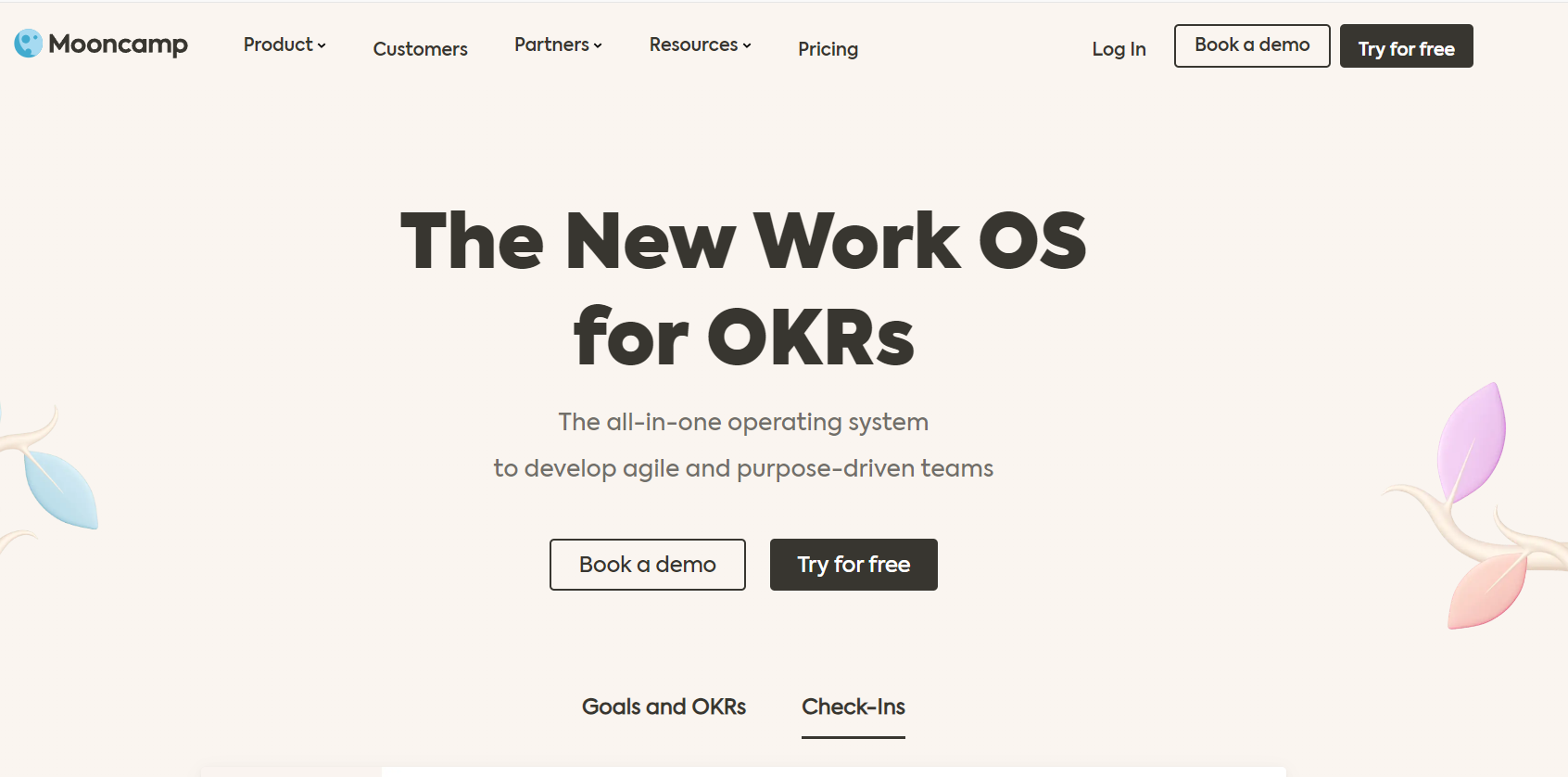
Mooncamp is a user-friendly OKR software solution designed to help businesses of all sizes create, manage, and track their strategic goals effectively. With its intuitive interface and real-time tracking capabilities, Mooncamp promotes a results-driven organizational culture, fostering alignment and boosting productivity across individuals, teams, and the entire organization.

Coda is a powerful OKR management platform that simplifies the process of creating, tracking, and visualizing organizational goals. With a strong emphasis on employee engagement, Coda facilitates cross-functional collaboration, ensuring that projects are effectively monitored, measured, and aligned with strategic objectives.
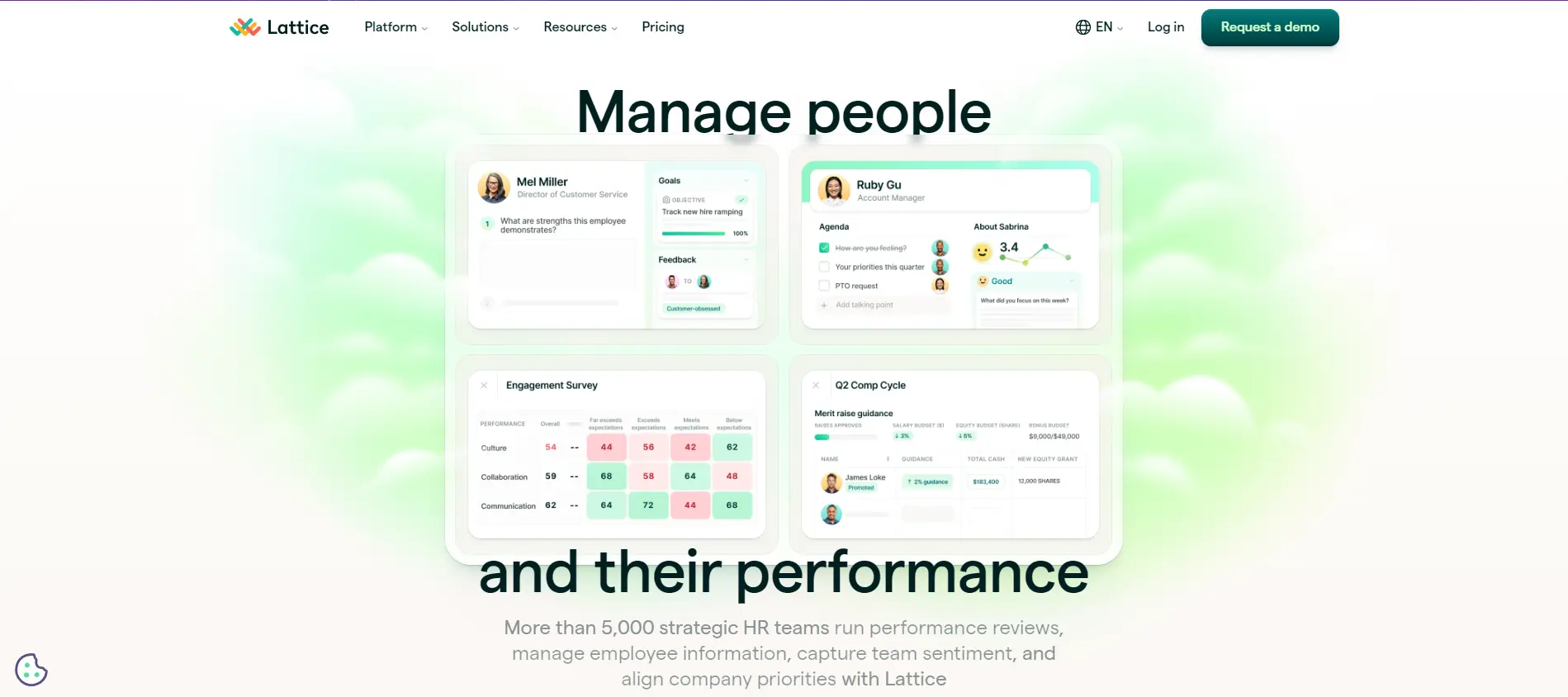
Lattice is an OKR tools solution designed to support small and medium-sized businesses in tracking objectives, facilitating collaboration, and sharing progress updates. This platform goes beyond goal management by providing a holistic performance management ecosystem, enabling employees to communicate, engage, and grow within their roles.

Trello, a renowned project management tool, offers a visually appealing and intuitive approach to OKR tracking through its Kanban board-based interface. By leveraging pre-built OKR planning templates, teams can easily map out their objectives and associated key results, updating progress periodically with a simple drag-and-drop interface.

Hive is a comprehensive project management platform that seamlessly integrates goal-setting and tracking capabilities. Its powerful Goals application allows users to create and monitor customizable objectives and key results, fostering alignment between individual and organizational goals.
Being a leading provider of the most up-to-date data solutions, it understands that OKRs are critical for success. A good number of companies have used our complete OKR management software to steer their goals in the right direction and monitor progress toward achieving them.
Datalligence appreciates that good goal management entails more than simply setting objectives or monitoring key results. It is about creating a culture of openness, collaboration, and improvement on an ongoing basis. Our platform works in harmony with your current workflows, ensuring real-time updates, data-backed decision-making as well as interdepartmental coordination.
Key Features:
Explore how Datalligence can help you streamline goal setting and tracking for your organization. Visit the Datalligence OKR Tool to learn more and schedule a demo.
Profit. co’s OKR solution is designed to help organizations prioritize goals, streamline execution, and maximize resource utilization. With its intuitive dashboard, managers can easily track progress, identify potential roadblocks, and make data-driven adjustments to ensure alignment between tactics and strategic objectives.

15Five’s strategic performance management platform is designed to help HR leaders and organizations track performance with ease. The tool enables organizations to set goals at both the organizational and individual levels, while providing a transparent dashboard for collaboration and progress tracking, fostering accountability across teams.

ClickUp is a versatile project management solution that offers a comprehensive library of customizable templates, including those specifically designed for OKR management. Its flexible framework allows organizations to tailor their goal-setting and tracking processes to their unique needs while leveraging powerful automation capabilities to streamline workflows.
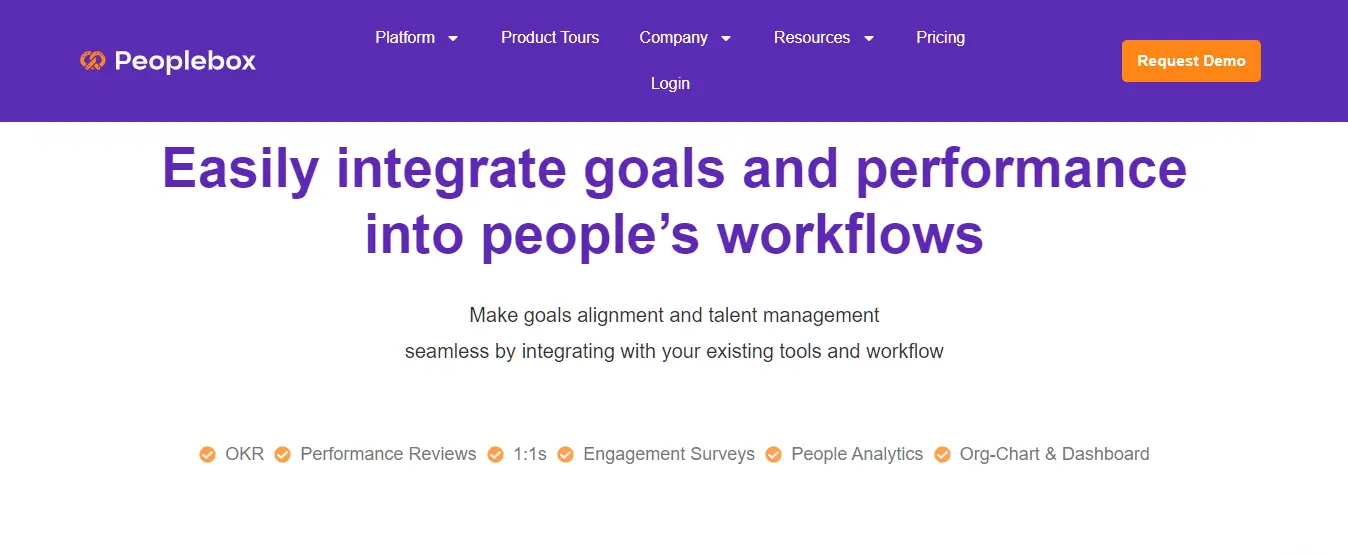
PeopleGoal is a comprehensive performance management platform that offers a dedicated OKR application for setting, managing, and tracking objectives and key results. With its robust reporting and analytics capabilities, organizations can gain deep insights into their OKR data, enabling data-driven decision-making and continuous improvement.

Perdoo is an OKR management platform that emphasizes goal alignment and integration, making the process of setting and tracking objectives and key results less intimidating for organizations new to the concept. With its user-friendly interface and guided approach, Perdoo ensures that objectives are clearly defined and results are measurable, promoting transparency and collaboration across the organization.
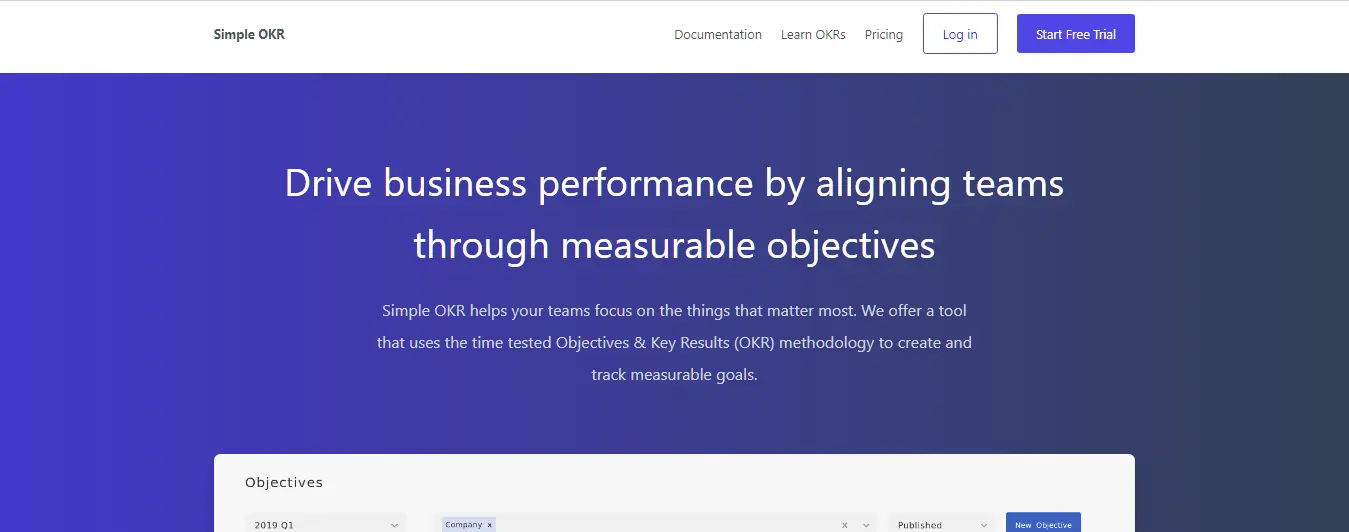
Simple OKR is a goal-setting and tracking tool designed to incentivize employees by demonstrating how their contributions directly impact the organization’s overarching goals and priorities. By setting a focused set of three to five high-level objectives, Simple OKR empowers teams to align their efforts and collectively work towards achieving these critical milestones.
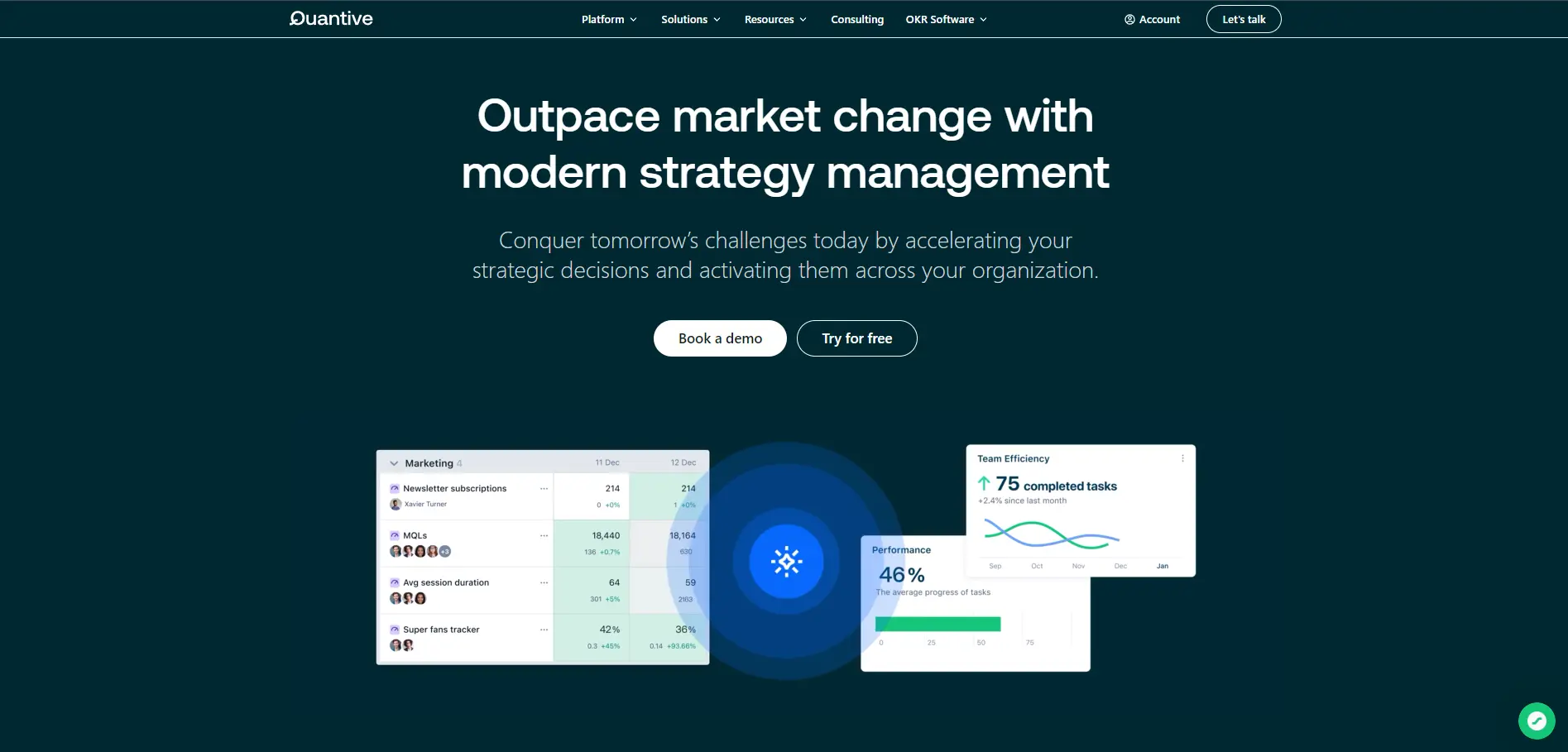
Quantive is an OKR software solution that seamlessly integrates project management capabilities, offering a comprehensive platform for setting goals, tracking progress, and managing tasks and resources. With its intuitive interface, customizable templates, and collaborative features, Quantive empowers teams to maintain a clear line of sight between their day-to-day activities and the overarching strategic objectives.
BetterWorks is a powerful goal and OKR platform designed to facilitate strategic organizational alignment and enhance employee performance. With its transparent performance snapshots and collaborative features, BetterWorks fosters open communication between managers and direct reports, enabling continuous feedback and course correction.
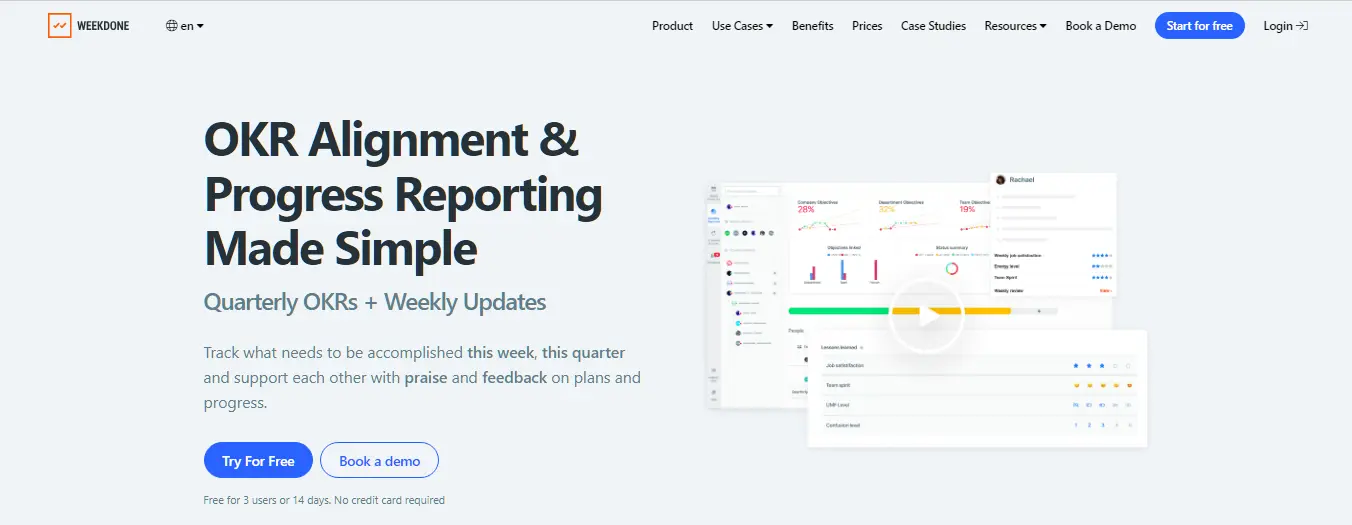
Designed with large enterprises in mind, Weekdone offers a comprehensive OKR solution that facilitates organizational performance measurement, tracking, and improvement. While supporting long-term goal-setting, this platform excels in weekly progress updates and cross-departmental communication.
Embracing the Future of Goal-Driven Success with Datalligence
As the business world continues to evolve, goal setting and progress monitoring have immense potential. In this regard, embracing the OKR methodology and finding the suitable best okr software for startups can enhance transparency, alignment, and accountability leading to continued success.
Datalligence appreciates the significance of data-driven decision-making in organizations. This enables companies to optimize processes, make informed choices, and achieve tangible results from big data using our breakthrough solutions.
We will help you find your OKR tools that meets your peculiarities because we work with small startups and giant corporations. Our professionals are ready to assist you in selecting, introducing, and merging the ideal solution so that you’ll have a smooth changeover resulting in maximum ROI for your business.
Closely maintain your organization’s goals via subscribed objective setting as well as following up on their performance at Datalligence for a future where it always manages its objectives irrespective of its size or nature through a continuous improvement culture while also operating within a dynamic commercial environment.
An OKR management platform is a tool designed to help you set and track your goals using the OKR (Objectives and Key Results) framework. It helps you organize your goals, measure progress, and ensure everyone in your organization is aligned.
These platforms make it easier to set clear, actionable goals and track progress towards them. They help keep your team focused, improve communication, and make sure everyone is working towards the same objectives.
An OKR platform helps streamline goal-setting and tracking, improves transparency, and keeps everyone aligned. It boosts team engagement and helps drive better performance by making objectives clear and progress easy to monitor.
Most OKR management platforms can integrate with popular tools like Slack, Google Workspace, and Microsoft Teams. Check the platform’s integration options to ensure it fits well with your existing setup.